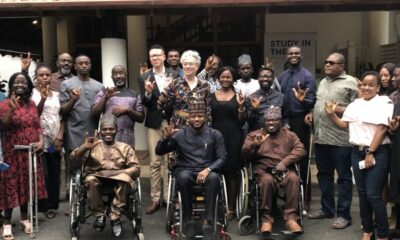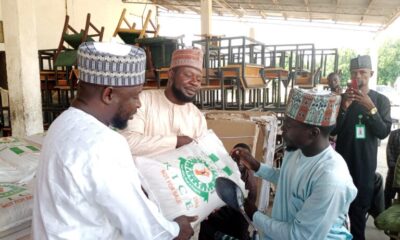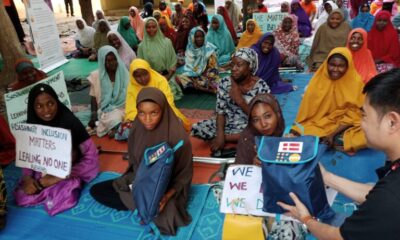Headline
Consider us for palliatives, PWDs in Ekiti appeal to Gov. Oyebanji

Some persons living with disabilities (PwDs) in Ikole-Ekiti on Tuesday appealed to the Ekiti State Governor, Mr Biodun Oyebanji, to make provisions for palliatives for them, to cushion the effect of fuel subsidy removal.
A cross section of the physically challenged individuals who spoke with the News Agency of Nigeria (NAN) in Oye-Ekiti said they were currently experiencing hardship and did not have money to buy foodstuffs.
One of the PWDS, Mr Sodiq Haruna lamented that the cost of living for him had become unbearable as he could no longer eat twice daily.
He said many residents who always gave him money to feed were no longer giving him because they hardly had enough for themselves.
Haruna appealed to the state governor, Mr Biodun Oyebanji, to assist the PWDs with palliatives especially with food items to enable them feed to be alive.
“ Honestly, this is the worst period of my life, I eat once in a day and hardly have N500 to buy food.
“Some of my friends are equally experiencing even worse hardship because they are blind and find it difficult to move around freely to find food to eat.
“ I just want to beg our governor to give us palliatives so that hunger will not kill disabled persons in Ekiti,” he appealed.
A visually impaired person, Mr Moses Godwin, said that he could not engage in any job because of his inability to see.
He appealed to both the local government councils and state government to consider the PWDs in the community for palliatives.
Another physically challenged/orthopedically disabled man, Mr Sola Ogunniyi, said the cost of food, drugs and transportation were no longer affordable for him.
He noted that the decision of the Federal Government to remove fuel subsidy was good but relief packages should have been, first of all, provided for the less privileged ones.
“As I speak to you, the cost of food has become too expensive for me to buy because as a shoemaker, I am currently experiencing low patronage as a result of lack of money.
” The decision by the Federal Government to remove fuel subsidy is a good development but some of us who are disabled need government financial support to fend for ourselves,” he said.
Ogunniyi appealed to Gov. Oyebanji to give priority to the welfare of persons with disabilities in Ekiti.
Similarly, Mr Godswill Ekemefuna, another physically challenged man, appealed to the state governor to approve palliatives for PWDs in the state.
He noted that they were the most vulnerable to the current challenges in the country and needed support from both the federal and states governments.
Headline
Fagbemi warns against obstructing EFCC from performing its lawful duty

The Minister of Justice, Lateef Fagbemi, SAN has warned against obstructing the Economic and Financial Crimes Commission (EFCC) from carrying out its lawful duty .
Fagbemi’s warning is contained in a statement in Abuja.
“This is a matter of very grave concern, it is now beyond doubt that the EFCC is given power by the law to invite any person of interest to interact with them in the course of their investigations into any matter, regardless of status.
“Therefore, the least that we can all do when invited, is not to put any obstruction in the way of EFCC, but to honourably answer their invitation.
“A situation where public officials who are themselves subject of protection by law enforcement agents will set up a stratagem of obstruction to the civil and commendable efforts of the EFCC to perform its duty is to say the least, insufferably disquieting’’.
He added that running away from the law will not resolve issues at stake but only exacerbate them.
“Nigeria has a vibrant judicial system that is capable of protecting everyone who follows the rule of law in seeking protection.
“I therefore encourage anyone who has been invited by the EFCC or any other agency to immediately toe the path of decency and civility by honouring such invitation instead of embarking on a temporising self-help and escapism.
“This can only put our country in bad light before the rest of the world’’.
He said institutions of state should be allowed to function effectively and efficiently.
“I stand for the rule of law and will promptly call EFCC, and indeed any other agency to order when there is an indication of any transgressions of the fundamental rights of any Nigerian by any of the agencies’’.
NAN reports that the EFCC had on Wednesday warned members of the public that it was a criminal offence to obstruct officers of the Commission from carrying out their lawful duties.
Section 38(2)(a(b) of the EFCC Establishment Act makes it an offence to prevent officers of the Commission from carrying out their lawful duties. Culprits risk a jail term of not less than five years.
The warning , the EFCC said, became necessary against the background of the increasing tendency by persons and groups under investigation by the Commission to take the laws into their hands by recruiting thugs to obstruct lawful operations of the EFCC.
On several occasions, the anti graft agency said, operatives of the Commission have had to exercise utmost restraint in the face of such provocation to avoid a breakdown of law and order.
Headline
Unknown Gunmen Abduct Channelstv Reporter In Port-harcourt

Some unknown gunmen have kidnapped Joshua Rogers, the ChannelsTV reporter in Port-Harcourt, the Rivers State capital.
Politics Nigeria learnt that Rogers was picked up close to his residence at Rumuosi in Port Harcourt and to an unknown destination by the gunmen around 9pm on Thursday, April 11.
The reporter was driving his official ChannelsTV branded car when the hoodlums accosted, pointed a gun at him and took him away in the same vehicle.
Rogers was said to be returning from his official assignment in Government House after a trip to Andoni for a government event when the incident happened.
Already, the gunmen were said to have contacted his wife and demanded a N30million ransom for bis release.
His cameraman confirmed the incident and appealed to his abductors to set him free unconditionally.


















